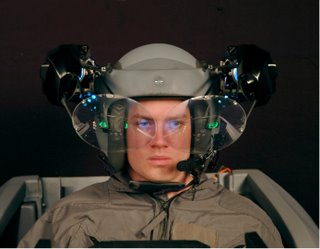
A carbon-based biological combat functionary equipped with the latest Situational Awareness Combat and Kinetic Overview Semantic Heuristical Informational Tautological System (or "SACKOSHITS") that allows the US to distinguish "war" and "not-war" , providing the US with actionable parameters for engagement on any conflict, subject to the will of God and the PNAC.
In a recent press briefing Tony Snow was asked regarding the current fighting between Israel and Hezbollah in Lebanon and in reference to Bush seemingly sitting on the sidelines “…why is this not our war?”
Snow responded: “Why would it be our war? I mean, it's not on our territory. This is a war in which the United States -- it's not even a war. What you have are hostilities, at this point, between Israel and Hezbollah. I would not characterize it as a war.”
“War” tends to be officially declared from the outset, or else defined as such upon completion (no-one really announced “men of the Middle-Ages, we are about to begin the Hundred-Years War!”)
But though the US never officially declared war on Iraq (or Afghanistan), everyone accepted it as a war and used the term freely.
Israel hasn’t officially declared war either but this isn’t some border skirmish (which is how it started). Israel is bombing the crap out of Lebanon and some troops are across the border and engaging with Hezbollah who are retaliating with missile attacks on Israel. 9 days on, Tony Snow’s “hostilities” have thus far lasted “officially” longer than the 1991 Gulf War.
The subtext of Tony Snow’s response seems to be this: It’s not a war until the US says it is and as long as it isn’t a “war” it doesn’t deserve major US involvement.
Why is the White House suddenly so coy about using the term?
One reason might be protocol—it’s up to Israel to declare war, which it hasn’t actually done.
Another issue concerns civilian casualties and the prospect of war crimes; the BBC has a cogent piece about that here http://news.bbc.co.uk/2/hi/middle_east/5198342.stm
It may also be that the Administration would prefer to avoid the term, given the unpopularity of the “War in Iraq”; major involvement in this situation might be one war too many (despite recent saber-rattling regarding Iran the White House has chosen to stick with diplomacy thus far).
And it may be that identifying it as a war might trigger some informal (or possibly formal) obligations (to Israel) or protocols that Bush would just as soon not have to deal with right now.
But never mind the esoterics of subtext, whatever the motivation or motivations for once the White House doesn’t seem to be rushing to judgment or action (and given its international record and the complexities of the situation, reticence may well be the best course for the moment).
Two armies arrayed against each other on mutually defined areas of engagement or fighting over possession of military assets over a period of time, ultimately leading to concessions by one side, or a mutual halt to combat is perhaps the “classic” definition of war and history offers many examples. But if so then World War II surely began to change the nature of war for four simple reasons—air power, mechanization of ground troops, industrialization and urbanization.
In WWII warfare could be conducted from a significant distance, and supporting resources became military targets. During the American Civil War civilians could and did picnic on safe vantage points as Union and Confederate armies clashed, before returning home exhilarated by the spectacle.
In WWII civilians had no such luxury for the war was carried to their homes and workplaces, and that’s been the case ever since. Population growth and the concentration of industry and jobs into large urban areas has made the “battlefield” extinct and so too the old definition of war. WWII also redefined the distribution and confluence of industrial, political and military power through the break up of traditional militarily controlled empires, the last being the collapse of the Soviet Union.
Viewed from the remaining imperial throne, this latest exchange of munitions and death may not meet the old definition of war, but for those on the receiving end, on both sides and to the armed and the defenseless, it surely is exactly that.
Here's a glimpse of what war most immediately involves:

This is an unofficical portrait of a soldier after "major combat operations are over".

I have no idea why or how this kid died. He could have been a legitmate combat casualty. Or not. I also don't know whether bullets or shrapnel opened up his head, but that white stuff is his brain spilling out.
I actually saw such a thing once from a car accident, but there's a big difference in the context of the event and consequence--accident is one thing, but war is premeditated.

And here's Tony Snow. the new public face of the Bush administration which is oh so happy to wage war, but hesitant to declare it or define it.
This juxtaposition of pictures is specifically unfair to Mr Snow who is only doing his job defending the policies and incompetence of his immediate employer ( ignoring the fact that his "employer" is actually an employee also, of the American public--in theory anyway).
The point is that Tony Snow and his superiors have never seen the immediate consequences of war first-hand and never will, therefore their concept of war will continue to revolve around semantics and statistics, and the pronouncements they make and the decisions they take will continue to be made absent of experience of reality.
To them war is a political concept, not a present reality. They might not call it war, but war it is.

